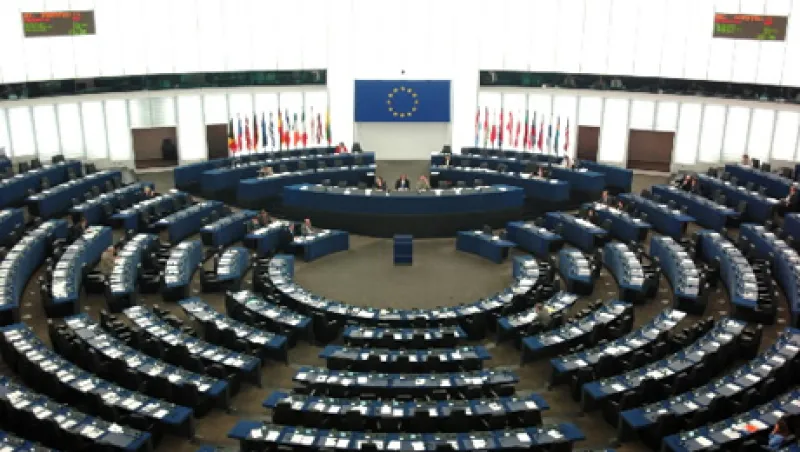Financial markets move at lightning speeds that contrast sharply with the slowness of the European political process. Whether politicians and financiers can bridge the gap in coming weeks likely to decide the fate of the euro.
The signals coming out of this weekend’s annual meetings of the International Monetary Fund and World Bank were not positive. Bankers and officials alike stepped up pressure on euro area leaders to take bolder and faster steps to prevent the bloc’s sovereign debt problem from spinning out of control. U.S. Treasury Secretary Timothy Geithner urged European governments to “create a firewall against further contagion,” while Bank of Canada Government Mark Carney said governments needed to amass about €1 trillion ($1.35 trillion) in firepower – more than double the bloc’s existing €440 billion bailout facility – to “overwhelm” the crisis.
European officials stuck to their current script, however, insisting that the group needs to focus on ratifying an agreement struck by EU leaders in July to increase the flexibility and effective size of the bailout fund, the European Financial Stability Facility. The German Bundestag is due to vote on that agreement on Thursday (September 29), and parliaments in skeptical Finland and the Netherlands also need to give their assent in coming weeks. No one wants to put ratification in jeopardy by talking about additional government support for the periphery before that accord is adopted.
German Finance Minister Wolfgang Schäuble offered a bracing message of German tough love in a speech to the Institute of International Finance, a banking lobby that meets alongside the IMF meetings. European governments were determined to defend the euro, he said, but he offered no hint that Berlin was ready to stump up more money. Instead, he said states with excessive debts need to aggressively pursue fiscal austerity and economic reform. And he rejected the view put forward by the IMF itself this week that too much deficit reduction by countries like Germany and the U.S. in the short term would worsen the economic slowdown and make debt problems even more intractable.
“We won’t come to grips with economies deleveraging by having governments and central banks throwing – literally – even more money at the problem,” he said. “You simply cannot fight fire with fire.”
In the short term, markets are worried about Greece’s spiraling mountain of debt, which will exceed 150 percent of GDP this year, and waning political support for austerity in Athens at a time of deep economic recession. Bruce Kasman, J.P. Morgan’s chief economist, told an IIF panel that the current EU-IMF economic program has pushed Greece into a recession more severe than Argentina’s a decade ago and would drive its debt up to more than 190 percent of GDP by the end of this decade; it’s arguable that the country would be better off leaving the euro, he suggested, an option that remains anathema for EU officialdom. “Greece is insolvent and the European monetary union and the EU as a whole needs to deal with it,” Kasman said. “It hasn’t come to terms yet with how to deal with it.”
Greek Finance Minister Evangelos Venizelos last week hinted that the government would try to negotiate a bigger writedown of private-sector bondholdings than the 21 percent included in the July agreement to persuade Greeks; some analysts argue that a 50 percent writedown is necessary. But Josef Ackermann, the Deutsche Bank CEO and head of the IIF, which helped negotiate the July writedown, warned against asking more of banks. As it is, many lenders are balking at the July terms. “If we now start to reopen that Pandora’s box, I think we lose a lot of time and I’m not sure people will be willing to participate,” he said. Any unravelling of the July deal, moreover, would threaten a Greek default and the spread of contagion, he added.
European officials are working behind the scenes on ways to prevent contagion, whatever happens with Greece. One idea, proposed a few months ago by Deutsche Bank chief economist Thomas Mayer and suggested by Geithner to euro area Finance ministers a little over a week ago, would turn the EFSF into a bank and have it buy bonds from countries like Italy and Spain with a liquidity backstop from the European Central Bank. “We need to find something more credible to give support to Italy,” Mayer told a panel at the IMF meetings.
But Jürgen Stark, who announced his resignation from the ECB earlier this month because of his opposition to the bank’s existing bond purchases, insisted that the idea would never fly. “It is a step too far,” he told Institutional Investor on the margins of the IIF meeting. “It is monetary financing” of government debt, something that’s strictly forbidden by the Maastricht Treaty that established the euro. Stark also sent a thinly veiled rebuke to U.S. officials to focus on their own debt problems. “All governments should do their homework before giving advice to others,” he told an IIF panel.
Another idea being discussed would have the EFSF provide first-loss guarantees for buyers of Italian and Spanish bonds. A 20 percent first-loss guarantee, for example, would effectively leverage the EFSF’s funds by five to one, giving it greater market impact and luring private investors back into the market. The mechanics of such an arrangement would take weeks to work out at the least, and would almost certainly require overt political backing from Berlin, Paris and other capitals. The silence so far from EU leaders – pledging support for the euro but not spelling out how that might be achieved – doesn’t suggest a plan B is waiting in the wings.
The dilemma is clear, said Ackermann. Markets are demanding a comprehensive and credible plan to contain the debt crisis, he said, but the politics are daunting. “This is a very difficult political matter to convince taxpayers ... that it’s in their best interest to support the periphery,” he said.






